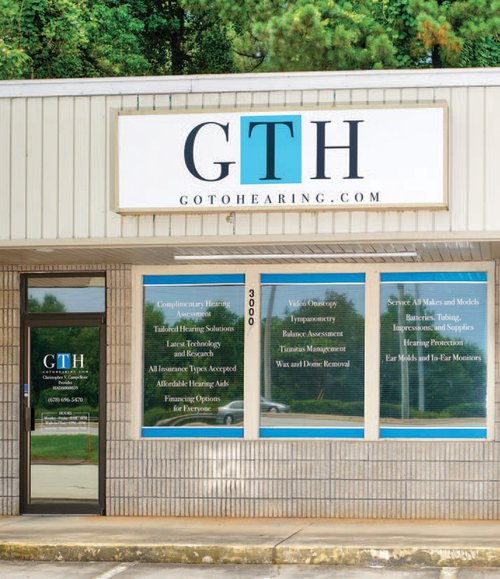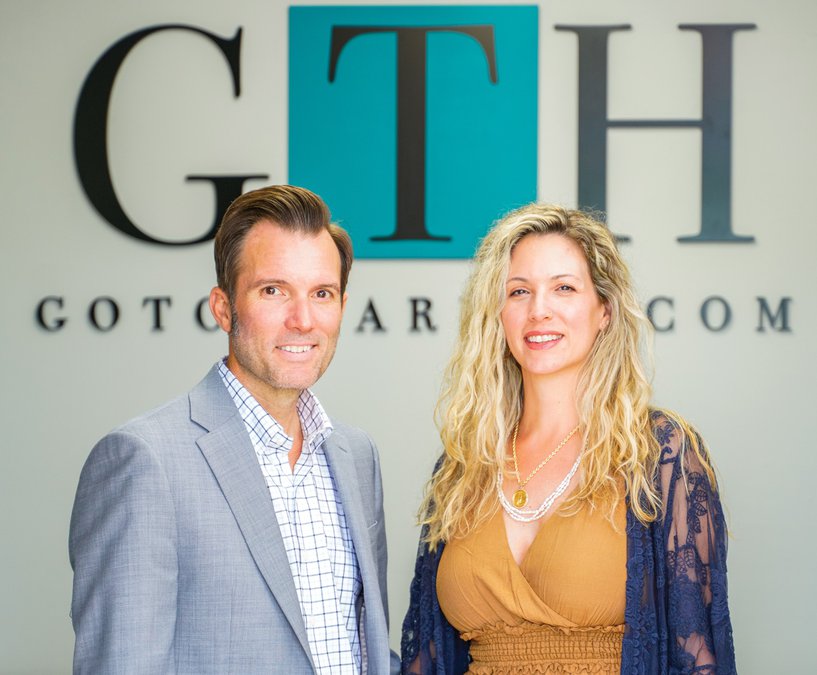Sponsored content from one of our advertising partners
This content made possible by GoToHearing
When Chris Campellone and his wife, Danielle, moved to Flowery Branch almost 15 years ago from California, it was with intentions for a better life. They anticipated better schools for their four young children, friendly neighborhoods to raise the family in, and the chance to see amazing things no matter what direction they drove in. They checked all those boxes, but stumbled upon something more, because through a divine blend of old and new connections, the former finance and real estate minded Campellone found himself in the hearing aid industry. He spent more than a decade training under corporate licenses, before realizing that what he could do for his community on his own would be life changing – for himself and his patients.
“I know I can’t fix the world, but I do know that I can make a difference in my community, and in the people that I serve, and help them hear better,” says Campellone. “One of the things I’ve struggled with for so long is that people don’t get adequate care [for hearing loss], so I knew it was time for me to break off and go back to my roots, to private practice; and that has allowed me to pursue my passion.”

As Campellone will tell you, one’s passion doesn’t just appear overnight – it’s something that develops over time. And what he discovered was that his passion lay in wanting to give hearing loss patients something much better.
As a result, he and Danielle opened GoToHearing in April of this year, offering something unique in an industry stifled by financial driven, one-size-fits-all treatments. In their own practice they can design a treatment plan to meet each patient’s individual needs, despite what they can or cannot afford. And because the Campellones care, it is now a practice with a reputation well beyond their community, one earmarked by Chris’s several awards on both the local and national level and more than 5,000 patients treated successfully since the beginning of his career.
In addition, GTH provides a full menu of services to its patients, including hearing aid services and repairs, as well as other hearing-related treatments such as earwax removal, tympanometry, otoacoustic emissions, video otoscopy, balance assessments, and tinnitus management. They are also partnering with several local companies to assess employees’ preventative care and annual hearing checks.
Surprisingly, GoToHearing’s long list of treatment options and the equally impressive resume of experience and awards are not the reason a growing number of patients at GTH are both happy and loyal. The reason is the way patients feel when they walk through the doors.
“We are deeply invested into each of the patients that come in here,” says Campellone, one of less than 200 licensed hearing aid dispensers in Georgia. “We want them to feel like family, and be comfortable here, knowing that there is never any pressure. They get extremely personalized, high-quality hearing care that’s never a one-size-fits-all approach.”
“So many of my patients are alone in this journey,” he adds. “People come to us with advanced stages of hearing loss, and it’s hard for their families to understand what they’re going through. There are things that we can fix and there are things that we cannot fix. We have to deal and cope with some of those things, and the other is part of a journey we take them through. That journey is different for everyone, and we can guide them on it—that is what we do as providers. We’re with them every step of the way.”
A patient’s experience with GTH includes initial hearing loss assessments, custom fittings for the device, and routine adjustments and check-ups to help patients learn to hear with their new hearing aids. It is not a one-and-done process. In fact, Campellone says a patient who may have lived with hearing loss for 7-10 years before coming in may spend several years learning to hear again and getting comfortable with their hearing aids.

Campellone further explains that with hearing loss comes a drastic change in our social behaviors. When we can’t hear, our brain learns to restructure and reformat things. That changes how we understand, and how we act and interact with others. As the brunt of jokes, or as a result of lack of understanding, we begin to disengage. That leads to depression, other health problems, an accelerated cognitive decline, and possibly dementia.
What he wishes is that more people knew how easy it was to improve quality of life and curb your chances for additional health problems with the simple treatment of hearing loss.
“In this day and age, if you’re not getting busy living, you’re getting busy dying,” he says. “We’re dealing with a demographic of people that have enough health issues to shake a stick at, and this is something that’s completely treatable if you take the proper steps. You can save yourself a lifetime of issues if you just deal with it. It’s an easy test, and an easy procedure. Yes, there are costs involved, but those costs are a game changer for your health.”
The critical component to that game changing decision is trusting in GTH’s driving principle of individualized care. Campellone explains that it matters how long a patient has suffered from hearing loss, how old they are, if they’ve tried hearing aids before or if they’re a first-time user. It’s much more than just putting a generic hearing aid on anyone; but through a compassionate, custom care approach, patients can learn to hear again.
“When you’re dealing with hearing loss, you’re losing one of your primary senses,” says Campellone. “As the great Helen Keller said, if she could regain one of her senses, it would have been her hearing because hearing is what connects people together. How we hear and how we understand is the bond we have with one another. That’s how we interact. It’s a very intimate part of peoples’ lives.”
Campellone exemplifies this firsthand, as his connections with people are one of the reasons his family came to Georgia. He’s paying it forward now, striving to bring his passion to life, and make that change for the better in his small corner of the world.
"Like I tell my kids, in life, much of who we are and who we become has a lot to do with those people that cross our paths," says Campellone. "As I look back at those people in my life, my mentors, my guides, I realize how much their influence has steered me in one direction or another. Now, being an advocate for my own patients, going to bat on behalf of them, gaining their trust in my approach to becoming a partner in the prospect of potentially regaining their hearing, and tangibly improving their quality of life— that is my passion.
“The difference here, in what we do, and in what we offer our patients is I that truly want to make a difference in my community,” says Campellone. “Our awards, they don’t change anything. Instead, it’s what we do for our patients, it’s how we treat them. I want to be the best for them, I want to offer them the best; because that’s what is going to make a difference in their lives,” and that’s definitely something worth hearing.

